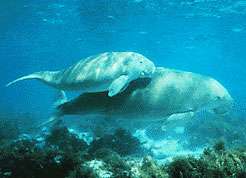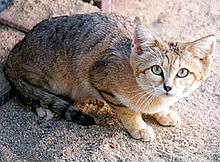List of mammals of Qatar
This is a list of the mammal species recorded in Qatar. There are seven mammal species in Qatar, one of which is vulnerable, and one is near threatened.[1]
The following tags are used to highlight each species' conservation status as assessed by the International Union for Conservation of Nature:
| EX | Extinct | No reasonable doubt that the last individual has died. |
| EW | Extinct in the wild | Known only to survive in captivity or as a naturalized populations well outside its previous range. |
| CR | Critically endangered | The species is in imminent risk of extinction in the wild. |
| EN | Endangered | The species is facing an extremely high risk of extinction in the wild. |
| VU | Vulnerable | The species is facing a high risk of extinction in the wild. |
| NT | Near threatened | The species does not meet any of the criteria that would categorise it as risking extinction but it is likely to do so in the future. |
| LC | Least concern | There are no current identifiable risks to the species. |
| DD | Data deficient | There is inadequate information to make an assessment of the risks to this species. |
Some species were assessed using an earlier set of criteria. Species assessed using this system have the following instead of near threatened and least concern categories:
| LR/cd | Lower risk/conservation dependent | Species which were the focus of conservation programmes and may have moved into a higher risk category if that programme was discontinued. |
| LR/nt | Lower risk/near threatened | Species which are close to being classified as vulnerable but are not the subject of conservation programmes. |
| LR/lc | Lower risk/least concern | Species for which there are no identifiable risks. |
Subclass: Theria
Infraclass: Eutheria
Order: Sirenia (manatees and dugongs)
Sirenia is an order of fully aquatic, herbivorous mammals that inhabit rivers, estuaries, coastal marine waters, swamps, and marine wetlands. All four species are endangered.
- Family: Dugongidae
Order: Rodentia (rodents)
Rodents make up the largest order of mammals, with over 40% of mammalian species. They have two incisors in the upper and lower jaw which grow continually and must be kept short by gnawing. Most rodents are small though the capybara can weigh up to 45 kg (99 lb).
- Suborder: Myomorpha
- Family: Muridae (mice, rats, gerbils, etc.)
- Subfamily: Gerbillinae
- Genus: Gerbillus
- Wagner's gerbil, Gerbillus dasyurus LR/lc
- Genus: Gerbillus
- Subfamily: Gerbillinae
- Family: Muridae (mice, rats, gerbils, etc.)
Order: Cetacea (whales)

The order Cetacea includes whales, dolphins and porpoises. They are the mammals most fully adapted to aquatic life with a spindle-shaped nearly hairless body, protected by a thick layer of blubber, and forelimbs and tail modified to provide propulsion underwater.
- Suborder: Mysticeti
- Family: Balaenopteridae (baleen whales)
- Genus: Balaenoptera
- Bryde's whale, Balaenoptera brydei DD[2]
- Genus: Megaptera
- Humpback whale, Megaptera novaeangliae CR (Arabian Sea population)[3]
- Genus: Balaenoptera
- Family: Balaenopteridae (baleen whales)
- Suborder: Odontoceti
- Superfamily: Platanistoidea
- Family: Phocoenidae
- Genus: Neophocaena
- Finless porpoise, Neophocaena phocaenoides DD
- Genus: Neophocaena
- Family: Delphinidae (marine dolphins)
- Genus: Sousa
- Indo-Pacific humpbacked dolphin, Sousa chinensis DD
- Genus: Grampus
- Risso's dolphin, Grampus griseus DD
- Genus: Orcinus
- Killer whale, Orcinus orca DD[4][5]
- Genus: Sousa
- Family: Phocoenidae
- Superfamily: Platanistoidea
Order: Carnivora (carnivorans)
There are over 260 species of carnivorans, the majority of which feed primarily on meat. They have a characteristic skull shape and dentition.
- Suborder: Feliformia
- Suborder: Caniformia
- Family: Canidae (dogs, foxes)
- Genus: Canis
- Golden jackal, Canis aureus LC
- Genus: Canis
- Family: Canidae (dogs, foxes)
Order: Artiodactyla (even-toed ungulates)

The even-toed ungulates are ungulates whose weight is borne about equally by the third and fourth toes, rather than mostly or entirely by the third as in perissodactyls. There are about 220 artiodactyl species, including many that are of great economic importance to humans.
See also
Notes
- This list is derived from the IUCN Red List which lists species of mammals and includes those mammals that have recently been classified as extinct (since 1500 AD). The taxonomy and naming of the individual species is based on those used in existing Wikipedia articles as of 21 May 2007 and supplemented by the common names and taxonomy from the IUCN, Smithsonian Institution, or University of Michigan where no Wikipedia article was available.
- Balaenoptera edeni
- Dead Humpback Whale found
- Other Species - UAE Dolphin Project
- Killer whale in Qatar 30\4\2012 حوت قاتل في قطر
References
- "The IUCN Red List of Threatened Species: Mammals of Qatar". IUCN. 2001. Retrieved 22 May 2007.
- "Mammal Species of the World". Smithsonian National Museum of Natural History. 2005. Archived from the original on 27 April 2007. Retrieved 22 May 2007.
- "Animal Diversity Web". University of Michigan Museum of Zoology. 1995–2006. Retrieved 22 May 2007.

